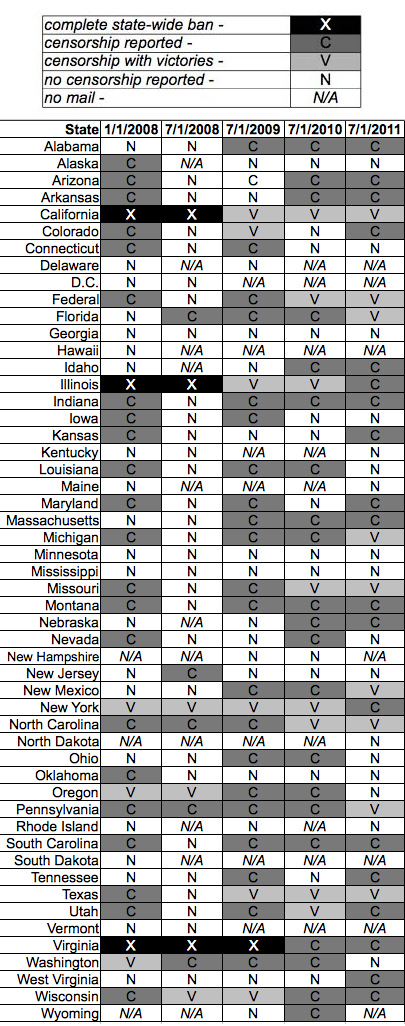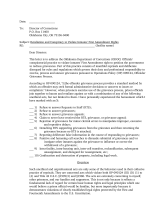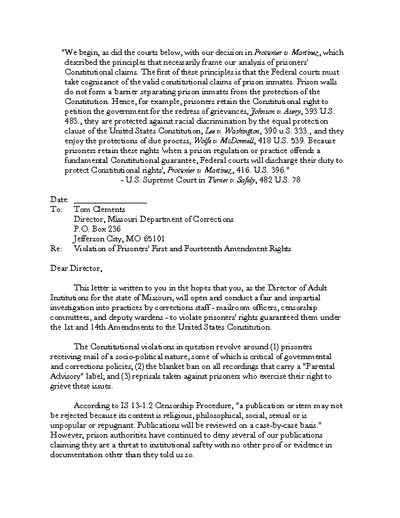
July 2011 Censorship Report

We rely on information directly from prisoners and returned mail to track our censorship. For the 2011 reporting year, only 72% of all mail was not reported as censored or received. This is a big improvement from last year’s 83% unreported mail status. We see two causes for this change. One is that we stopped giving everyone who wrote to us automatic 6 month subscriptions, and instead required confirmation of receipt (or censorship) of a sample issue of Under Lock & Key first. This not only reduced the amount of mail we sent in by 30% from last year, but pushed those who wanted Under Lock & Key to confirm receipt of the sample issue, doubling the amount of people reporting receiving ULK.
Another contributing factor to the high reporting rate is the institution of Unconfirmed Mail Forms, which is a short form we send out to encourage individuals to report the mail they’ve received. We primarily send these forms to people we suspect are experiencing censorship of our materials. Even if you don’t receive one of these forms, you should still tell us everything you have gotten from us since the last time you wrote. Since we ask about the entire history of mail we’ve sent in, not just in this reporting year, the institution of the Unconfirmed Mail Forms (UMFs) has improved our stats on past years as well. In the last year we’ve improved the amount of mail unreported for the July 2010 Report from 83% to 78%. We plan to continue using UMFs to better assist in tracking our censorship.
Like we reported in MIM(Prisons) 2011 Congress Summary and Resolutions, in the past six months we have been focusing our resources on building cases and recruiting lawyers rather than writing letters to administrators. Most of the victories in the fight against censorship come from prisoners filing appeals and defending Under Lock & Key in hearings. MIM(Prisons) plays a supporting role in ensuring that the administrators know that someone on the outside is paying attention and publicizing their illegal actions. So while it is not of vital importance that we write these letters, it has still helped overturn censorship in enough cases that we find it worthwhile to pick up this task again.
Victories
A major victory was won against Dona Ana County Detention Center in Las Cruces, New Mexico this year. A prisoner won a partial settlement for censorship issues. The settlement names MIM Distributors and Under Lock & Key and is in favor of prisoners’ rights to receive “copied” material. If you are experiencing censorship for copies, write in for this information.
Red Onion State Prison in Virginia has been notorious for censoring Under Lock & Key to the point where we haven’t heard of our newsletter getting in since issue 5 (November 2008). The Final Call and Prison Legal News both won settlements in favor of getting their newsletters into Red Onion in recent months. Since the treatment of The Final Call and PLN was similar to the treatment of ULK, we are hoping that those settlements will impact how ULK is received at Red Onion. This is yet to be determined.
Changes
A reasonable expectation for our anti-censorship work is that when we win a victory in a state, we should either continue to have victories there or no longer experience censorship. Of course this expectation wouldn’t apply if the conditions within the state change and become more repressive. In the cases of New York, Illinois and Colorado there have been victories in the past but only censorship without victories in this reporting year. In Illinois and Colorado, some victories have been connected to outside pressure put on by MIM(Prisons). This leads to the logical conclusion that victories would be more likely if we continued to apply this pressure.
In New York there doesn’t seem to have been a connection between outside pressure and victories. Those reversals in censorship came strictly from the hard work of New York prisoners fighting for their own rights. We are unsure if the current lack of victories is due to a change in conditions in the NYDOCS or a lack of prisoners fighting censorship.
There is a hunger strike happening in Pelican Bay State Prison in California that is well under way. In June 2011 we heard word that our mail had recently started getting in just prior to the start of the strike after experiencing major censorship there for years. In the last year 44% of the mail we’ve sent into Pelican Bay has been confirmed as received (13% confirmed as censored), compared to the previous reporting year’s 25% received (57% censored). Hopefully the hunger strike will be successful in granting people held in PBSP their five core demands, including an end to mail tampering.
Future Struggles
While we try to win as many victories as possible through writing letters, if a facility or state won’t follow the law, then it eventually becomes necessary to take them to court. Due to our limited resources and time, we encourage the prisoners affected by the censorship to fight the issue as far as they can. In Arizona we came to one of these brick walls related to the censorship of a study group assignment for “promot[ing] racism and/or religious oppression” without containing any words that refer to race or religion. We reported on this issue in Under Lock & Key 18 and are still struggling to find a lawyer that will take on this important case.
And yes, mailroom staff in California are still clinging to the 2006 memo banning MIM Distributors, which was nullified in a settlement between Prison Legal News and CDCR way back in 2008. Can you believe it? The California institutions that are still favoring this method of censorship are Deuel Vocational Institution and Pelican Bay State Prison.
In Salinas Valley State Prison in California, rather than citing the overturned memo, the Warden creatively assures us that the staff was new at the time and have now been retrained, or claim to simply not see mail from MIM Distributors arriving there. This is completely bogus considering we consistently send in ULKs every time there is a new issue, in addition to persynalized letters and other literature. When we called the Warden out on the fact that there was no change after the “new staff” was “retrained,” he simply baselessly told us there is no censorship and “no evidence the mailroom staff are negligent in their duties or MIM Distributors mail was illegally tampered with as you claim.” No shit, there’s no evidence if you just throw the mail in the trash! While some mail gets into SVSP sometimes, they are still highlighted on our list of brick walls we are determined to break.
In Nebraska the ACLU has picked up on censorship of our materials and has been doing research, writing letters, and may eventually file a suit on behalf of MIM Distributors and the prisoners facing censorship. They have reviewed most if not all issues of Under Lock & Key and have determined that “the prison is violating both [MIM(Prisons)’s] First Amendment rights and the rights of the prisoners.” We are excited to be working with the ACLU to hopefully set a precedent in Nebraska that protects people held there against censorship. We encourage any lawyers on the outside to follow their example and get with MIM(Prisons) to fight censorship in prisons!









